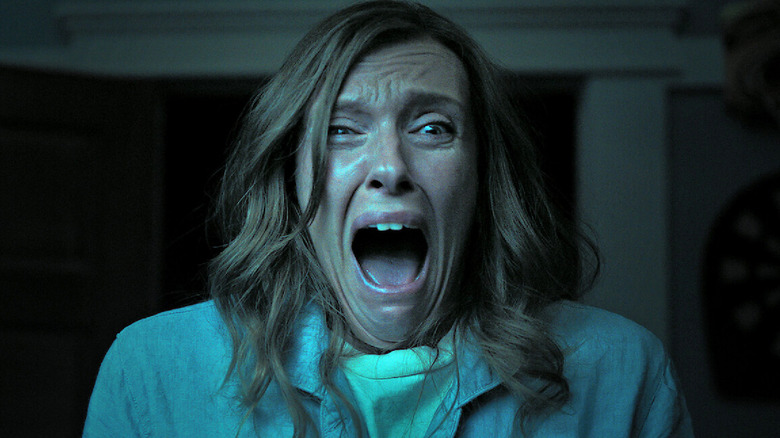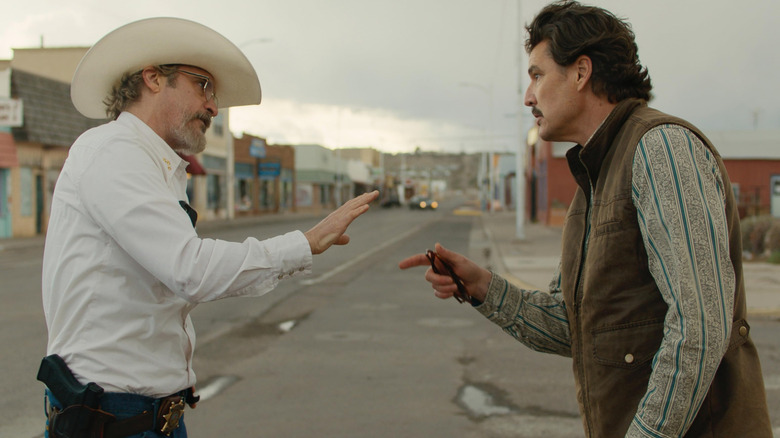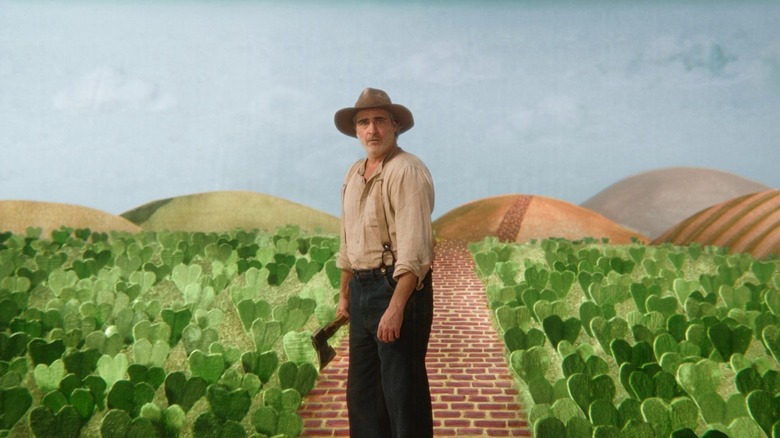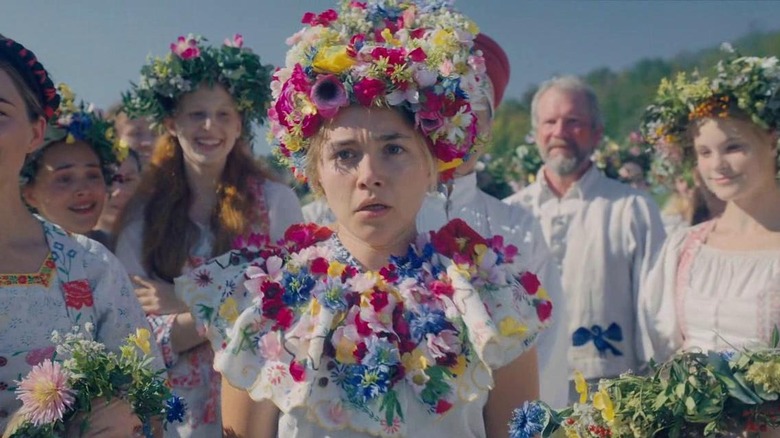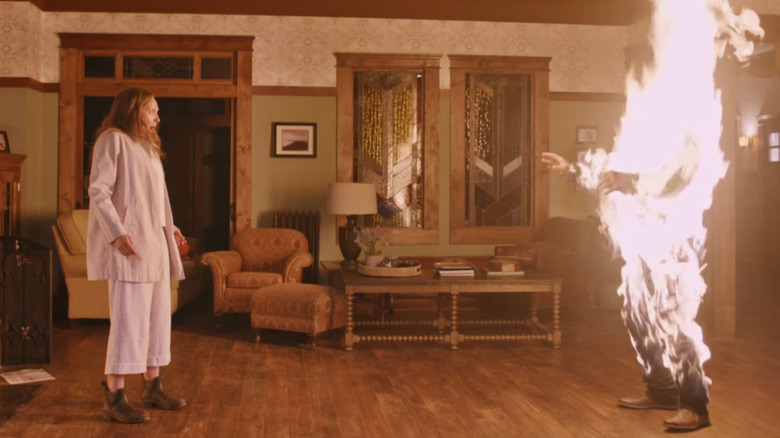All 4 Ari Aster Movies Ranked From Worst To Best
Ari Aster's movies are often considered the cornerstone of the A24 horror cinema ecosystem. However, like any well-known director, his works, which include 2018's "Hereditary" and 2025's "Eddington," are a bit more complicated than their respective reputations. For one thing, Aster's movies are constantly obsessed with tormented parent-child dynamics. For another, his features also frequently chart the dangers of lonely people finding community in the absolute worst possible places. Then, of course, there's the way horror plays into even his dark comedies like "Beau is Afraid" and "Eddington." This filmmaker's relentlessly bleak works never let up in their vision of planet Earth as one where all kinds of chilling sights lurk around every corner.
Though the "Midsommar" auteur has only helmed four films, this quartet of features already offers a profound window into his artistic sensibilities and obsessions. Granted, doing this exercise also reflects that not everything Aster touches is gold. This filmmaker's most recent works, which go beyond straight-up horror movies, have especially suffered from bloat and unimaginative lead performances. However, the creative peaks of his most revered titles make it abundantly clear how, in less than a decade of directing features, Ari Aster has already become a established name. Get your flower crowns on and dollhouses ready: to best appreciate what motifs and artistic flourishes populate Ari Aster's filmography, let's rank his movies from worst to best.
4. Eddington
Every great filmmaker has their dud. Steven Spielberg made "The Lost World: Jurassic Park," for instance, while Dee Rees was responsible for "The Last Thing He Ever Wanted." However, Ari Aster's "Eddington" is such a staggeringly miscalculated misfire that it makes one question his artistic prowess. This modern Western takes place in summer 2020, as MAGA-leaning sheriff Joe Cross (Joaquin Phoenix) gets into a rivalry with mayor Ted Garcia (Pedro Pascal) in the small town of Eddington, New Mexico.
It's a dark political satire skewering the prevalence of both division and violence in American society, but also a tremendous slog that isn't nearly dangerous or subversive enough. Its commentary on Black Lives Matter protestors and right-wing nutjobs would have been freshly relevant in 2021. Meanwhile, the rote handling of unhoused or non-white characters betrays the film's impulses to "shock" viewers. How can a movie register as "transgressive" when it can't break free of stereotypical cinematic norms?
Not helping matters is Joaquin Phoenix sleepwalking through the modern-day Red State schlub that actors like Simon Rex have previously portrayed both better and with more specificity. Even Aster's previously sharp visual instincts are abandoned. "Eddington" looks immensely drab, not to mention frustratingly tied down to reality. While "Beau is Afraid" overflowed with audacious imagery, the compositions and camerawork in "Eddington" rarely register as special. At 155 minutes, it's an understatement to say that "Eddington" overstays its welcome. A blight on Aster's filmography, "Eddington" betrays the ambitions that made his previous works compelling.
3. Beau is Afraid
"Beau is Afraid" is a nerve-wracking exercise that's totally uninterested in making audiences feel comfortable. The end result is a feature that certainly gets too excessive for its own good. However, it's also a deeply idiosyncratic exercise with plenty of visual panache.
Ironically, Joaquin Phoenix, despite his outstanding work playing psychologically tormented characters in masterpieces like "You Were Never Really Here," is the film's weaker link. Given that the movie focuses on anxiety-prone Beau (Phoenix) traveling back to his home for his mother's funeral, the leading man is on-screen for nearly every frame. His performance, though, isn't especially distinctive and sometimes feels too derivative of past turns from Phoenix. It doesn't help that against-type supporting turns from Parker Posey and Nathan Lane upstage him.
While Phoenix's lead performance is erratic, the movie's imagery is outright dazzling. Aster and cinematographer Pawel Pogorzelski fill this film with heightened visuals reflecting a psychologically tormented man's psyche. The result is that nearly every frame has some memorably imperfect flourishes, while the bright color scheme and lighting make all those ominous details extra-apparent. The director also demonstrates great comic chops here, such as in his precise timing with a sight gag involving Beau and a computer with a shoe plunged into it. Gangly and imperfect, "Beau is Afraid" is also so unflinchingly daring that it's hard not to get on its wavelength.
2. Midsommar
Nobody does painful, heaving cries like Florence Pugh. That talent becomes immediately apparent in the opening scenes of "Midsommar," as her character Dani (Florence Pugh) weeps in the lap of her boyfriend Christian (Jack Reynor) over the loss of her parents and sister. These outsized expressions of grief are outright uncomfortable to watch. Are we, as moviegoers, even supposed to witness such vulnerable behavior?
Ari Aster's "Midsommar" script continues that thread of letting audiences glimpse the unthinkable as Dani, Christian, and their friends attend a midsummer festival in Sweden's Hälsingland region. This community and their traditions (the latter of which include elderly people jumping off cliffs to their grisly deaths) are hidden from the world, which means neither Dani nor the viewer have any clue what insanity lies in store for them.
"Midsommar" is a beautiful depiction of madness. Incessant sunlight rains down on the Swedish locale, while bright colors (including all the flowers on Dani's now iconic third act outfit) are abundant. Those qualities make for a fascinating contrast with the ceaseless brutality (not to mention white supremacy) nestled within this community. Aster unveils the most hideous sights and bursts of violence in blinding daylight, where audiences can see every nook and cranny of the depravity. This marvelous visual exercise is also tremendously well-paced as it peels back the layers of how unhinged this community is. Best of all, Florence Pugh is a perfect, captivating anchor for the proceedings, even when she's not delivering unforgettably squirm-inducing sobs.
1. Hereditary
It's easy to take for granted now how good "Hereditary" is. We've all seen clips of Toni Collette's most iconic monologues from the film, while the plot's darkest moments have inspired endless memes across every corner of the internet. However, it's truly staggering to consider how well-constructed "Hereditary" is, especially since it's Aster's first time helming a feature-length movie.
The film, which chronicles Annie Graham (Collette) and her family crumbling in the wake of endless tragedies and demonic intervention, is a disturbing domestic drama that sends chills up one's spine through intricate filmmaking. The sound design, for instance, is a thing of beauty. All throughout "Hereditary," eerie bursts of noise or skittering sounds seem to emanate from the deepest, darkest corners of any room. Potentially frightening forces don't just exist in the viewer's line of sight — the sound design makes danger omnipresent.
Collette's performance is also a magnificent accomplishment. Her unbridled work vividly displays how cyclical familial abuse keeps getting passed down from one generation to the next. Unsurprisingly, this esteemed actor is absorbing even in her subtlest moments. The movie is also crammed full of nightmare-inducing visuals involving things like decapitation or bugs consuming a young man's face. Aster's script superbly oscillates between heightened horror and more grounded sequences evoking a more unhinged rendition of "A Long Day's Journey Into Night." Whether you're talking about its visuals, performances, or sounds, "Hereditary" is an artistic triumph that still towers over all other Ari Aster features.
